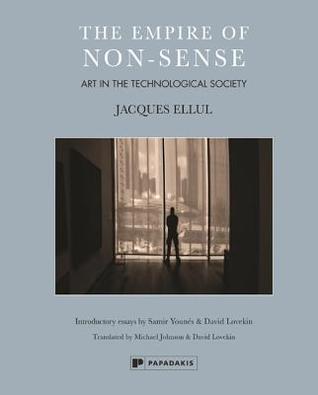- Bíblia
- Leia a Bíblia
- Versões da Bíblia
- Verso do dia
- Planos de Leitura
- Versos por Tópico
- Books of the Bible
- Imagens bíblicas
- Estude
- Comentários
- Concordâncias
- Dicionários
- Enciclopédias
- Sermões
- Bible Atlas & Maps
- BP Wiki
- Devocionais
- Devocionais de hoje
- Light of the World
- Todos os devocionais
- Inspirational Quotes
- Mais
- Picture Quotes
- Videos
- Inspirador
- Estudo da Bíblia
- O que a Bíblia diz
- Bible Q&As
- Daily Bread
- Bible by Genre
- Bible Stories
- Random Bible Verse
- Comunidade
- Store
The Empire of Non-Sense: Art in the Technological Society
by Jacques Ellul
Many modern artists and architects continue to imagine and build the world technologically. Their beliefs remain firmly rooted in their assumption that the liberating forces of technology freed them from previous artistic traditions while making available vast means of production and a plethora of materials. All artistic traditions were seemingly put aside by the paintings of Cezanne, the poetry of Baudelaire, and the architecture of Le Corbusier. Behind this apparent freedom French critic Jacques Ellul, author of the classic The Technological Society, found an absolute slavery. The artist was the handmaiden of technology, a relation the artist no longer understood, like other citizens of technological culture. Artists acclaimed their unbridled individualism while being intensely determined by the forces of technological culture. Ellul examines this process in modern art from the beginning of the 20th century where the sense of art - its meaning and embodiments - is reduced to non-sense. Ellul's study is in the tradition of Guy Debord's The Society of Spectacle and Theodor Adorno's Aesthetic Theory but moves significantly beyond their Marxist perspectives that were, from Ellul's view, co-opted by technique."
BUY NOW
Hardcover, 168 pages
Published August 15th 2014 by Papadakis Dist A/C (first published January 1st 1980)
Se inscrever
© 2025 Bibleportal.com Todos os direitos reservados.

Jacques Ellul was a French philosopher, law professor, sociologist, lay theologian, and Christian anarchist. He wrote several books about the "technological society" and the intersection between Christianity and politics, such as Anarchy and Christianity (1991)--arguing that anarchism and Christianity are socially following the same goal.
A philosopher who approached technology from a deterministic viewpoint, Ellul, professor at the University of Bordeaux, authored 58 books and more than a thousand articles over his lifetime, the dominant theme of which has been the threat to human freedom and Christian faith created by modern technology. His constant concern has been the emergence of a "technological tyranny" over humanity. As a philosopher and lay theologian, he further explored the religiosity of the technological society.
... Show more